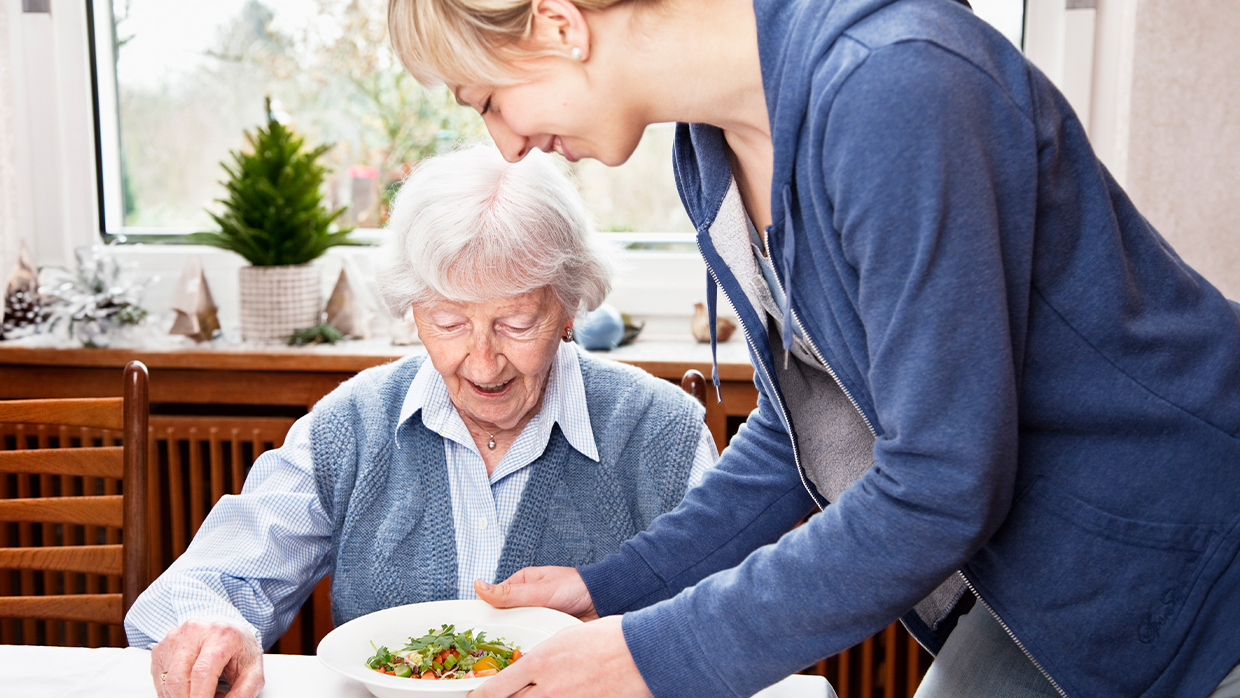Dietitians Provide Caregiving Support During the Holidays

Caring for an ailing family member brings many challenges. While being in comfortable surroundings is reassuring to the patient, family members can be overwhelmed with both the personal and medical issues of the person requiring care. Their own health may suffer as they attend to the daily needs of their loved ones. The holiday season can be especially stressful.
Optimal nutrition is a fundamental requirement for healing and well-being, and the Registered Dietitian Nutritionist (RDN) is the health professional specially qualified to address the nutritional necessities of both patients and caregivers.
Enabling Healthier Communities
Obtaining, preparing, and providing nourishment are major tasks of caregivers and can become burdensome. During the holidays, caregivers may either feel pressured to plan special meals or feel isolated and lonely in attending to the needs of their loved ones. Financial stressors also negatively affect holiday meal planning. This is where the input and resources available from Sodexo RDNs are so valuable.
RDNs are involved in community nutrition education programs, food pantries, healthy produce markets, and teaching kitchens. Sodexo also enjoys a special partnership with Abbott Nutrition to help caregivers identify and obtain nutrition supplements. These support outlets strengthen the bond of the caregiver with their community and enhance both their health and the health of the person they are caring for. RDNs focus on addressing the individual nutritional needs of both patients and caregivers in different ways:
Focus on Patient Needs
- Conducting a comprehensive nutrition assessment that evaluates biochemical, physical, and psychosocial status.
- Developing a nutrition care plan which outlines practical ways to meet individual nutrition requirements with healthy familiar foods and, if necessary, appropriate nutrition supplements.
- Providing nutrition education on the prescribed diet during hospitalization and also after discharge to both patients (if possible) and caregivers.
- Guiding preparation of textured-modified foods and the proper use of thickening agents if food and beverage consistencies must be altered.
- Prescribing appropriate formulas, rates, and amounts of enteral (tube feeding) or parenteral (intravenous) nutrition that will be continued at home and monitoring the provision and tolerance of these feedings.
- Reviewing nutrition guidelines and assisting in meal planning right in the convenience of home (through telenutrition).
- Identifying community resources for food procurement assistance (e.g., food pantries, meal delivery, etc.).
Maintaining Caregiver Health
Caregivers may be struggling with their own health issues. The stress of caregiving can lead to a neglect in their personal well-being. Erratic and unbalanced meals, inadequate rest, lack of physical activity, substance abuse, and emotional distress all can take a toll on the stamina needed to care for an ailing loved one. The RDN helps maintain the health of caregivers by:
- Evaluating the individual nutritional needs of the caregiver through individual counseling (either in-person or through telenutrition).
- Suggesting easy recipes and meal planning ideas.
- Recommending nutrient-dense snacks and supplements (either homemade or commercially available).
- Encouraging caregivers to take time for themselves and use mealtime as a chance to enjoy friends and family and to socially connect.
- Identifying other health resources for caregivers (e.g. food delivery programs; local and state health agencies; professional colleagues such as social workers and physical therapists; etc.).
A caregiver has the demanding role of attending to a loved one who cannot care for themselves. This requires emotional and physical strength. Sodexo RDNs use their expertise in bridging the basic comfort of food with providing individualized, medically tailored nutritional guidance to support both vulnerable caregivers and their loved ones and highlighting the community programs that can be helpful during stressful times.